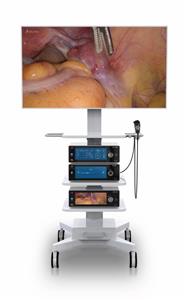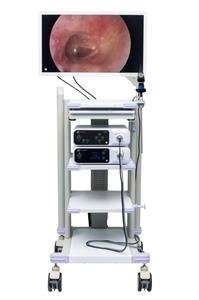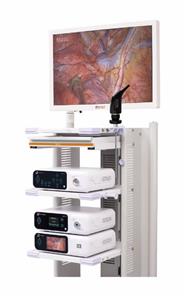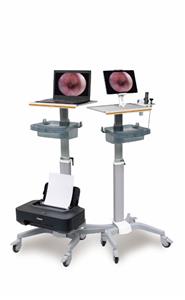Research on key technologies of fluorescence abdominal endoscopy imaging system
Optical molecular imaging technology is usually used to directly observe the lesions in the process of minimally invasive treatment, so as to achieve the purpose of precise treatment. Through the precise navigation of images, the treatment of diseases can be more accurate, systematic and perfect. In this paper, medical indocyanine green (ICG) was used as a fluorescent agent to build a fluorescence abdominal endoscopy imaging system, the camera was calibrated for the imaging system, and a fast fusion algorithm was proposed to achieve accurate tumor marking and display. The main research contents of this paper are as follows:(1) The construction of fluorescence abdominal endoscopy imaging system. The excitation light source composed of near-infrared light-emitting diodes of 780nm-20nm was used to irradiate the ICG to generate fluorescence information with a wavelength of about 810nm. The white light source composed of white light-emitting diodes is used to illuminate the field of view of the endoscope to generate imaging information under white light; the fluorescent image and the visible light image are collected by the CMOS camera; the main control board and the acquisition card are used for data transmission; processing, so as to realize the dual-channel imaging of the fluorescence laparoscopic endoscopy system. (2) Research on the calibration method of fluorescence laparoscopic imaging system. Improving the effect of endoscope distortion and realizing rapid calibration is one of the key technologies of fluorescence abdominal endoscopy imaging system. A stereo calibration structure is proposed, which is aimed at the situation that the radial distortion of the endoscope is large and the user does not know the calibration knowledge, and the calibration work can be completed by taking an image of the calibration target surface. The experimental results show that the calibration process of the proposed calibration method is fast, stable, and simple to operate, and the accuracy is comparable to that based on the plane calibration plate. (3) Research on fusion algorithm of fluorescence abdominal endoscopy imaging system. High-quality and rapid fusion of fluorescence images and visible light images is one of the most important key technologies in fluorescence laparoscopic imaging systems. A fast fusion algorithm based on saliency detection and fluorescence information enhancement is proposed. The fusion image of fluorescence and visible light images is used to mark the tumor, and the saliency detection and coefficient enhancement matrix are used to enhance the detailed information of the tumor. Compared with mainstream fusion algorithms such as discrete wavelet algorithm and Laplacian pyramid algorithm, the results show that the proposed fusion algorithm can provide good visual effects, and the peak signal-to-noise ratio, mutual information, edge retention and other indicators Algorithms that outperform the comparison. (4) Software design of fluorescence abdominal endoscopy imaging system. In order to realize the good interactivity of the fluorescence laparoscopic imaging system, the software of the imaging system was designed and built. It can realize the functions of information management, imaging display and report management, and basically meet the requirements of medical endoscope operating software.




